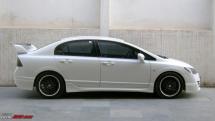What does a BHPian naturally want out of his stock machine? MORE POWER! Team-BHP tells you all you need to know about modifying your street car.
BEFORE you modify your car:
- Remember to practice SAFE DRIVING on public roads! With additional power comes the need for additional responsibility. Keep the racing restricted to track days and in other forms of competition (within a controlled environment).
- Enroll with a professional rally / racing / driving school. This will not only make you a faster driver but also a safer one. To quote a popular Pirelli tagline : Power is nothing without control.
- Ensure that you are with the right tuner. The quality of install and product is most important. Get your work done only by a tuner who has the relevant knowledge, infrastructure and dedication to carry out a high quality installation. The product quality is equally important and it is generally recommended to stick to reputed brands (wherever available). A bad modification can actually make your car slower than in stock tune. Poor reliability may also result from a bad installation, causing a great amount of heart-burn to you.
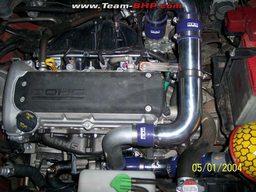
- Remember that the engine is a very complex system and each component has to work in harmony with everything else. Only then will you benefit from the performance modifications.
- Tune your car via a step-by-step method. This will allow you to gauge improvements in an incremental manner and fine-tune one modification before moving on to the next.
- Choose a “mod-friendly” car to start with. Most Japanese brands like the Hondas and Suzuki’s have tremendous after-market support in terms of parts availability and tuner capability. Simply put, there are some cars which inherently respond better to performance tuning. On the other hand, it is a pointless exercise trying to make heavy cars like the Contessa or a Mahindra Jeep go any faster! Pick your car based on what you want to achieve.
- Beware of cheap “go-fast” gimmicks like the Surbo and electric superchargers, which are nothing but an absolute waste of money. Common sense plays a vital role out here; why would you need a DTM corner slammer on a front wheel drive car that spends most of its time below 120 kph.
- Remember that Vitamin M (or Money!!) runs the show. Tuning your car can be an expensive proposition, so outline a detailed budget before moving on from stage to stage. Not only will the modifications cost you big $$$, but lowered fuel efficiency (almost certain) will cause another dent on your wallet. Some highly-modified cars or engines running an increased compression ratio may also require high-octane fuel to run efficiently.
- Invest in a popular timing device like the G-Tech series. This range of timing equipment will help you to gauge the benefits of your modification, and whether that actually translated into making your car faster.
- Remember that your warranty will almost certainly be nullified, if your car is within the coverage period.
- Think before you try to alleviate the visual appeal of your car via body kits and spoilers. Be warned that a badly-designed body kit will ruin the aerodynamics of your car and may cause it to become unstable at high speeds. Also, spoilers are merely for looks and, in any case, work only above 175kph.
Next Page >
STAGE ONE MODIFICATIONS:
- Upgrade tyres and alloy wheels:
Before adding more power to your car, it must have the adequate grip levels for current & future power delivery. Alloy wheels are not always necessary for a tyre upsize. A detailed guide on upsizing your tyres is available here: Choosing the right set of tyres for your car. Approximate cost = Rs.12,500 – 50,000.
- Air-Filter:
A stock replacement performance filter requires no modifications and is very simple to install since it fits exactly in place of your factory filter. The performance gains are marginal. Approximate cost = Rs.2,000 – 7,500.
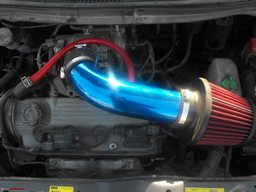
A Cold air intake (CAI) is the more serious of performance air-filters. With a CAI, proper installation is very important and it should not suck in hot air. The colder the air available to it, the better will be the gains in performance. A true CAI sucks in outside air, while short rams and most CAI applications take air from under the hood. Even if it's 35 degrees outside, that is still significantly cooler than the air under your hood. You can also opt for a good conical / universal filter without CAI. The plumbing needs to have minimum restrictions with most experts recommending mandrel bent aluminium pipes. The diameter of the pipe through its entire length should be uniform and greater than that of the throttle body. Do note that the sound levels with significantly increase with a CAI, and some precautions must be taken when driving in the monsoons. K&N recommends a shroud for use in dusty conditions. Approximate cost = Rs.5,000 – 17,500.
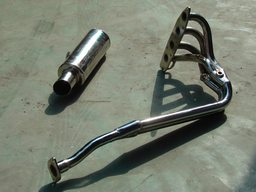
- Free-Flow Exhaust:
A well-designed free flow exhaust system improves the breathing abilities of your engine and can lead to good performance / fuel-efficiency gains. It is important to get a complete free-flow kit (including headers) and not a muffler / end-can kit only. A good header design is very important and you may specify to your installer a preference of low, mid or high-rpm gains. Very little time is actually spent at high-rpms so you might be better off asking for a low to mid-range power gain. The appropriate back pressure must be maintained else you will lose out on torque. An exhaust system is like a chain and only as strong as its weakest link. The most restrictive part is usually the cat-con or the mid-muffler. Some tuners will remove the cat-con, which will result in difficulty toward meeting the emission norms. Also, try and insulate the exposed part of the exhaust system within the hood with asbestos wire (cheap) or ceramic coating (expensive). Approximate cost = Rs.7,500 – 25,000. - Spark Plugs:
Performance plugs are pointless on a stock / marginally modified car. Iridium plugs have hardly any benefits and you will never notice them anyway. In case you do install the same, ensure that you pick up plugs with the correct heat range for your engine. Approximate cost = Rs.800 – 3,500. - Plug wires:
Same as above. After-market wires don’t add any performance to a stock or marginally modified engine. Only if your eventual modifications require an upgrade to a custom engine management system (or a high-performance ignition system) will your plug wires have some benefit. But at this stage, don’t opt for plug wires as you will only waste your money. Approximate cost = Rs.1,500 – 6,000. - Temperature signal modifiers:
These devices are fairly simple to install and result in marginal (if any) performance gains. They modify some signals that are delivered to the ECU, which results in altered fuel / ignition maps. Approximate cost = Rs.900 – 9,000. - Synthetic Oil:
Synthetic lubes are highly recommended by Team-BHP for the superior protection and enhanced lubrication on offer. The Synthetic oil vs. Mineral oil threadgives a detailed explanation about the same. Approximate cost = Rs.500 – 1300 per liter.
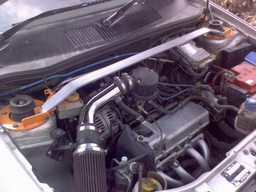
- Strut braces:
Strut braces / tower bars reduce flex, and help in increasing the grip levels / stability of the car through corners. However, it’s only under hard cornering that the difference is noticeable. Approximate cost = Rs.1,500 – 5,500. - Short-shifters:
Short-shifters shorten the throw of your gear-lever, and result in quicker gear shifts. Be advised that there is an optimum length of the shifter depending on the throw, ergonomics and your preferences, and it will take some getting used to. Most drivers are better off with a stock-shifter! Approximate cost = Rs.4,500 – 7,500.
Next Page >
STAGE TWO MODIFICATIONS:
- Performance suspension kits:
With the additional power that your engine is churning out by now, increased grip levels are a must. There are plentiful branded options available for performance struts, coils, coil-over springs, dampers (shock-absorbers) and camber kits (Polyurethane bush kits). Approximate cost = Rs.10,000 – 1,00,000. - Head Porting & polishing:
Cylinder head porting and polishing refers to enlarging and smoothening of the ports on the intake and exhaust. This results in better quality and quantity of gas flow-rates. Power gains are very noticeable from a high-quality porting and polishing job. Remember that the intake ports need to be finished rough while the exhaust ports should have a mirror finish. Approximate cost = Rs.9,000 – 15,000. - Removing the revv-limiter:
A fairly simple modification which any ECU specialist can implement in a very short time. Your cars manufacturer-set rpm limits will be raised but you also need to check if your engine internals can take the additional stress. It wont lead to a power increase with all engines; yet can be a useful tool in improving lap times (holding a gear longer) and acceleration (one less up shift for 0 - 100). Approximate cost = Rs.3,500 upward. - Nitrous oxide systems:
NOS, as they are popularly called, are cheap power shots and a favorite with drag racers. Due to the inherent nature of the gas, it is a very risky installation. Don’t go overboard with the dose else your engine will end up blown. Also make sure that you back the timing off by a few degrees. Take a look at this guide on setting your car up with nitrous. Approximate cost = Rs.22,000 – 75,000.
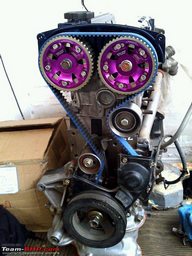
- Performance camshafts:
Performance cams are a superb modification and can add upto 10% - 20% more power, with options available for low, mid andhigh-rpm gains. An increase in compression ratio is highly recommended. Also insist on a cam adjuster (variable cam pulley for adjusting cam timing) to realise the full gains of the cam. It is important to avoid over-cam'ing while the more extreme profiles will surely require head work. High lift cams cost a packet and are not recommended for daily-driven cars since the low-end response is compromised, fuel-efficiency takes a beating and you will need to fiddle with idle settings to get it right. Approximate cost = Rs.12,000 – 35,000. - Map sensor signal modifiers:
These can improve part throttle performance, but will result only in marginal performance gains. Approximate cost = Rs.12,000 – 25,000. - Valve angling:
A multi-angle valve job can lead to noticeable street performance gains by improving the head flow. Note that this is a highly precision-oriented task. Approximate cost = Rs.3,500 upward. - Over-boring / Stroker kits:
Over-boring is increasing the CC (cubic capacity) by changing the piston size and stroke of the engine. Pistons, connecting rods and the crankshaft will need to be replaced. Simply put, bigger engine size = more power. For e.g. a 1.3 liter can be overbored to 1.5 liters in capacity. Approximate cost = Rs.12000 upward.
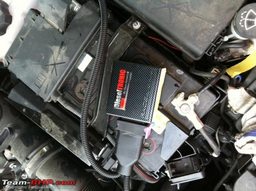
- Piggy-back ECU's:
Piggybacks are additional engine control units that work along with the standard ECU. They enhance engine performance and leave the non-engine electronic work to the standard ECU. A piggyback modifies some signals (sent back to the ECU) and plays around with the performance parameters only (fuel injection, timing etc.). Fuel controllers adjust the fuel mapping and allow the engine to increase its power output. An example of a fuel computer is the ApexI S-AFC. They offer a multitude of adjustments whereby you can run rich or lean, depending on the driving conditions. It is imperative for the piggy-back to be compatible with your ECU. Remember that the AFR signal adjustment is to be done only in tandem with a wide band AFR kit. Leave the tuning part to an expert. Approximate cost = Rs.12,000 – 35,000. - Engine remaps:
An ECU flash will give you higher power gains than a piggyback, by changing the entire characteristics and settings of the factory software. There are ready performance remaps available for a wide range of Indian cars and the installation procedure is fairly simple. If you plan on going further to stage three modifications, do the remap at the very end. Any reputable company is going to account for your full mod list in order to give you the best remap. Do the remap last, unless you want to do it twice. Approximate cost = Rs.23,000 – 60,000.
Next Page >
STAGE THREE MODIFICATIONS:
- Performance brake systems:
By the time you reach stage three, chances are that your current braking power is ineffective toward handling the additional engine punch. Upgraded boosters, performance discs and street / performance brake pads are available to improve your cars stopping power. Approximate cost = Rs.3,000 – 40,000. - Turbo-chargers:
Turbo's offer high power gains but don't exceed 6-8 psi on a stock motor. If you want to go higher than that, get ready for a seriously expensive investment in forged internals, sleeves etc. For a complete guide on turbo-charging, visit: Turbo-charging your car. Approximate cost = Rs.1,25,000 upward. - Super-chargers:
Super-chargers or "blowers" (as they are called in the tuner circle) are another method of forced induction. More expensive to install, they are driven off the engines crankshaft, unlike a turbo which is driven by exhaust gas energy. Super-charger kits are readily available for some engines, though Indian tuners prefer turbo-charging. For a detailed comparison, visit: Turbo chargers vs. Super chargers, and take a look at this link if you're considering supercharging. Approximate cost = Rs.1,25,000 upward.
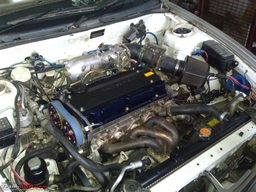
- Engine swaps:
When you have maxed out the power of your current engine, or simply want a bigger powerplant, engine swaps are a good option. Many tuner-friendly cars have a ready list of options available. D16 and B16 engines into Honda City’s, twin-cam Suzuki Swift GTi swaps into Maruti Zen’s and even Honda mills into Suzuki bodies are popular. Mitsubishi Lancers have various Mivec and EVO options. Swapping the engine is changing the "heart" of your car so consult only with tuners who have the necessary experience, knowledge and infrastructure; this is a very important consideration. Some swaps may not offer a bolt-on transition and will require heavy modifications to accommodate. Approximate cost = Rs.30,000 upward. - Upgrade clutch:
In stage three, a performance clutch may become a necessity to transfer the additional power effectively and quickly. Consider what the usage of your car will be before installing a performance clutch as varied options are available between street, drag and race applications. Some are a pain to use in bumper-to-bumper traffic. Approximate cost = Rs.10,000 – 50,000. - Lighter flywheel:
A lighter flywheel will improve throttle response at all rpms, since the inertia is lower. It works well with balancing the crankshaft. However, don’t add one to a stock engine else you will lose torque at low-rpms. Lightened flywheels are a good option for racing and make for a superb modification with a short (close-ratio) gearbox. Approximate cost = Rs.15,000 – 25,000. - Gearing:
The gearbox is one of the most important tools in extracting power from your engine, exactly where you want it (low, mid and high-rpms). You may choose to alter the final drive or go in for an entirely new custom gearbox. Your transmission may also require stronger drive-shafts to cope with the additional power. Approximate cost = Rs. 6,500 upward.
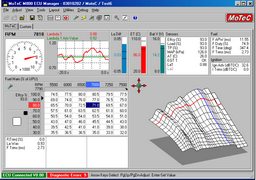
- ECU replacement:
The ECU (engine control unit) is the brain of your car and controls various engine parameters and functions. Custom ECU's can be tuned for specific engines where power gains vary from 5%(stock engine) to more than 30% (heavily modified engines). A stand-alone engine management system (Link, AEM, TEC-II etc.) allow great flexibility. With that flexibility comes complexity, custom fitting, and cost. As you progress within stage three, a replacement ECU will become necessary. A great feature of some stand-alones (with a toggle switch) is that they can be switched between performance and stock modes. Approximate cost = Rs.25,000 upward.
Some recommended safety add-ons:

- Roll cages
- Master Cut-off switch
- Fire Extinguisher
- Race Fuel Cell
- Race seats with 4 or 5 point harnesses
Other useful add-ons:
Full credit for this article goes to Ananthkamath, chetanhanda, Ford Rocam, mclaren1885, nextlevel350z, psycho, rdkarthik, sideways & v1p3r. The information in this article was compiled from their posts in the Dude I bolted on 25 BHP thread.
